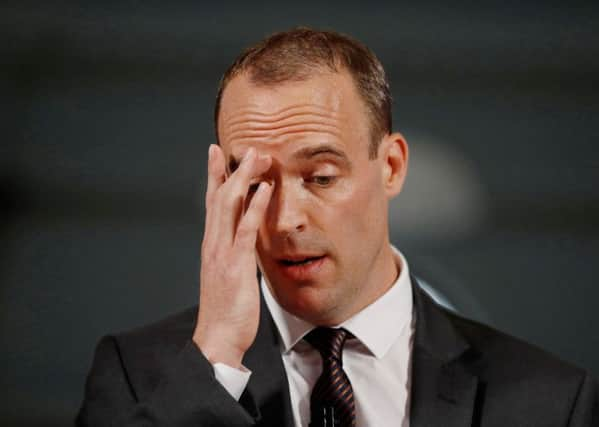Will Britain pay £39bn Brexit '˜bill'?


Today, it was the old classic about the so-called ‘Brexit divorce bill’ that had reared its head ahead of a summit of EU leaders due to take place next week.
Brexit Secretary Dominic Raab, who has been in the job just two months, struck a confrontational tone when he raised the prospect of Britain refusing to pay the bill, which represents Britain’s share of money committed to EU projects and payments until 2020.
Advertisement
Hide AdAdvertisement
Hide AdThe exact figure hasn’t yet been agreed between the UK and the EU 27, though a tentative figure of around £40 billion has been briefed by sources both at home and abroad.
As the chance of a ‘no deal’ departure from the EU, where the UK leaves without agreeing a future trading and regulatory agreement, increases, the Government is keen to make it known exactly what that entails.
That involves telling the British public about the difficulties that could arise from a no-deal Brexit, but Raab’s new stance shows that they are also keen to extend that to the EU and its leaders.
The Bill
Much has been made in ‘hard Brexit’ circles of the legality of the bill which Britain will pay on its departure from the 27-member union.
Article 50, the treaty which deals with the processes for a member state to leave the EU, makes no mention of an obligation on the part of the departing state to make a payment.
As with much of Brexit, the bill as a matter of negotiation, and most expected that as a show of good faith, the UK would have to make a contribution as party of a ‘divorce settlement’.
This is because swathes of the EU budget are calculated in a six-year cycle that runs from 2014-2020.
Advertisement
Hide AdAdvertisement
Hide AdBoris Johnson, even before he resigned in protest at Theresa May’s Chequers plan, said the UK should reject any demands for a payment, and other Brexiteers have even suggested that the UK would actually be owed money from the EU.
All or nothing?
Dominic Raab might not be adopting the hardline stance of the former Foreign Secretary, but he is making it clear that the UK considers the payment as an essential part of getting a deal that works for both sides.
The mantra of Theresa May’s Government has been to get the ‘best possible deal’ for the UK.
This new approach to the potential payments that the Government will have to give to the EU might help stave off Tory rebels, but is likely to be seen in Brussels as the UK negotiating in bad faith.
Likelihood
Mr Raab stated that if there is no deal, “the Government would not pay the terms of the financial settlement.”
Perhaps more telling than Raab’s muscular approach was his follow up comments that fully endorses the Government’s Chequers proposals, urging his colleagues to get behind them and pushing the EU’s team to ‘accommodate’ Theresa May’s approach.
Mr Raab is trying to make clear that the Chequer’s proposals are the best outcome for both sides, even though they are still unlikely to be backed in parliament.
Advertisement
Hide AdAdvertisement
Hide AdThe consequences for Britain are being revealed in a series of ‘technical papers’ (dismissed by hard Brexiteers as ‘scaremongering’), and the consequences for the EU are being made clear by this declaration by Mr Raab.
However, there remains enough desire on both sides to make a deal that will allow a future partnership between the UK and the EU.
There is no definitive answer yet to many of the Brexit questions, and the EU bill is no different.
However, as the likelihood of a ‘no deal Brexit’ rises, so too does the chance that the UK will refuse to pay a ‘divorce bill’.